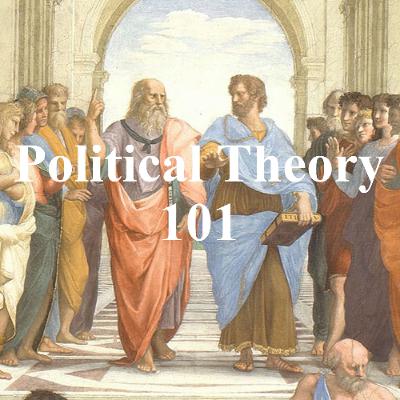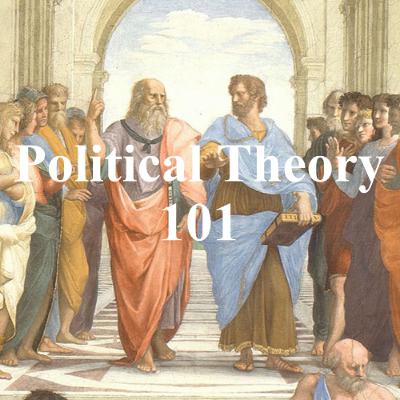Discover Political Theory 101
Political Theory 101

Political Theory 101
Author: Political Theory 101
Subscribed: 1,055Played: 10,282Subscribe
Share
© All rights reserved
Description
A podcast about political theory. Freely available to all, but we'd love your support on Patreon:
https://www.patreon.com/politicaltheory101
Also available on iTunes, Spotify, and Google Play
https://www.patreon.com/politicaltheory101
Also available on iTunes, Spotify, and Google Play
95 Episodes
Reverse
We discuss the work of American political scientist Murray Edelman, whose work on symbolic politics predates later French theory on the "spectacle".
We discuss Streit's 1939 proposal for a international federation of democracies to avoid a new world war. We explore the limits of argumentation and the difference between making an argument and doing politics.
We discuss Friedrich List's many careers, his struggle for a German customs union, his belief that nationalism would lead to the "uniting of all nations under a common law of right", what happened instead, and why.
We discuss Vico's theory of nature, his unorthodox mix of stereotypically ancient and modern approaches, and how his "new science" seems to be going so far.
A whole episode of Political Theory 101 devoted to Thomas Hobbes' Behemoth. We discuss Hobbes' historical narrative and his theory of education, both of which receive little attention in Leviathan.
Michael Downs joins Benjamin to discuss the political thought of Nick Land, its relationship to the work of Deleuze and Guattari, and the degree to which it has influenced the contemporary left and right.
We discuss how Plato used dialectical thinking to deal with objections to the theory of the forms. Then we discuss how this kind of thinking enriches our ability to make use of all sorts of political concepts and abstractions.
We discuss the work of John Morley, a British viscount heavily involved in the government of Ireland and India during the late 19th and early 20th century. Morley was a liberal, but he was often in situations in which his liberalism was pushed to its limit. We discuss how he thought about liberty as a young man, and how he worked to put his beliefs into practice in difficult circumstances.
Daniel joins Benjamin to discuss Plato's Philebus. We traverse the dialectic of limit and unlimit and discuss the difference between memory and recollection, connecting all of this to Plato's political thought.
Elizabeth Dearden-Williams, a former student of mine from Cambridge who is currently pursuing a masters, comes on to discuss the work of the Prussian general Carl von Clausewitz.
Chris Cutrone joins Benjamin for a discussion of political parties, focusing on the role pluralism plays in Chris' thinking about party structure.
John Milton isn't just the author of Paradise Lost! Raeffe Gibson makes a guest appearance to discuss his role in the English Civil War.
Alex and Benjamin discuss the work of Michael Pettis, putting him in conversation with older theorists of imperialism like J.A. Hobson and Vladimir Lenin.
Alex and Benjamin discuss Huntington's early emphasis on centralization and institutions, his turn toward civilizational thinking, and the position of religion - and particularly Catholicism - in his account.
Alex and Benjamin explore the history of political thought from the point of view of Bastiat - who threw many ancient and enlightenment thinkers together into the basket of plunderers. If we think we come from God whole and complete, the need for civic education falls away...
Alex and Benjamin discuss Terry Eagleton's work, focusing on interactions between religion and Marxism in the context of the "end of history" - the 1990s and beyond.
Alex and Benjamin discuss the Roman persecution of the Christians - why the Romans did it, how the Christians responded to it, and the ways the experience shaped Christian political thought going forward.
We explore the methodological contributions of the late historian of political thought, John Pocock. We talk about the role of language and context in interpreting texts, distinctions between "history" and "philosophy," and the implications of these methodological shifts for the political economy of the university.
Alex and Benjamin explore post-political themes in Haruki Murakami's rat tetralogy.
Alex and Benjamin delve into Habermas' notions of the public sphere, legitimacy, and communication. They also discuss postmetaphysical thinking.











🔴✅📺📱💻ALL>Movies>WATCH>ᗪOᗯᑎᒪOᗩᗪ>LINK>👉https://co.fastmovies.org
can you elaborate the part where you say that a secular state can never be stable
l'm listening this podcast and I enjoy it. 👍 Thank you my friends 🙏